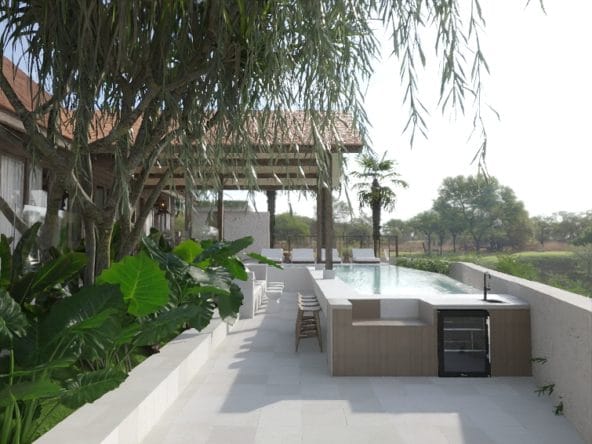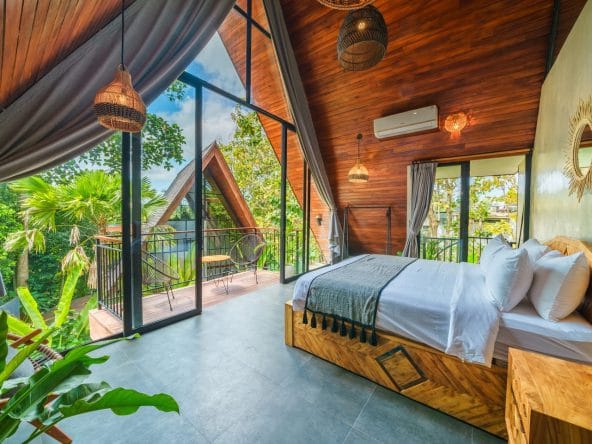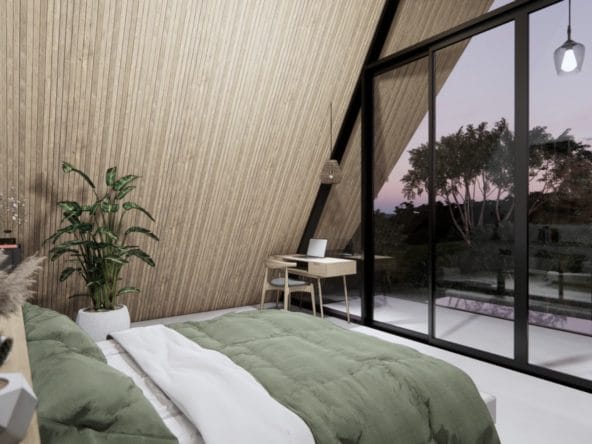Bali is leading the way in sustainable luxury villas, blending eco-friendly living with opulent comfort. In recent years, the island has also become a leader in sustainable living and eco-conscious practices, particularly in the hospitality and real estate sectors. As environmental awareness grows, many of Bali’s luxurious villas are embracing sustainability, proving that opulence and eco-consciousness can coexist harmoniously. Here’s how Bali’s finest villas are leading the way in sustainable luxury and eco-friendly living.
1. Energy Efficiency and Renewable Resources
One of the most significant ways that villas in Bali are adopting eco-conscious practices is through energy efficiency and the use of renewable resources. Many luxury villas now incorporate solar energy as a primary power source, using Bali’s abundant sunshine. Solar panels installed on rooftops or in garden areas allow these villas to significantly reduce their reliance on fossil fuels, cutting down on carbon emissions. For instance, solar-powered water heaters and lighting systems are becoming common features in many high-end properties.
In addition to renewable energy, villas are also designed with energy-saving technologies. This includes the installation of energy-efficient appliances, LED lighting, and smart home systems that allow residents to monitor and control their energy consumption remotely. Natural ventilation systems reduce the need for air conditioning. These villas take advantage of Bali’s coastal breezes. Eco-friendly insulation also helps maintain indoor temperatures, cutting down energy use.
Some villas are even incorporating geothermal energy systems and other innovative technologies to harness renewable resources and minimize environmental impact. By reducing energy consumption and transitioning to sustainable energy sources, these villas create a balance between luxury living and environmental responsibility.
2. Sustainable Building Materials
The use of sustainable and locally sourced building materials is another cornerstone of eco-conscious villa practices in Bali. Many luxury villas are constructed using materials that are not only durable but also environmentally friendly. Bamboo, for example, is a popular choice due to its rapid regrowth rate, making it a renewable resource that can be harvested sustainably. It is used in everything from structural frameworks to furniture and decorative elements, offering a blend of strength and aesthetic appeal.
Similarly, recycled wood and natural stone are frequently used in villa construction. These materials reduce the environmental impact by minimizing deforestation and waste. Recycled wood, sourced from old buildings or ships, is repurposed to create stunning flooring, walls, and fixtures. This practice not only reduces waste but also gives the villas a unique character, blending modern luxury with a touch of history.
Many eco-conscious villas are also designed with traditional Balinese architectural elements, such as open-air layouts and alangalang (thatched) roofs. These designs use natural, locally sourced materials, and are optimized for the island’s tropical climate. The result is a fusion of modern comfort and traditional craftsmanship, with an emphasis on sustainability.
By choosing local materials, these villas also contribute to the local economy, supporting Balinese artisans and builders, while reducing the carbon emissions associated with transporting materials over long distances.
3. Water Conservation Practices
In Bali, where water resources can be scarce in certain regions, water conservation is a critical aspect of eco-conscious villa design. Many sustainable villas have adopted technologies and strategies that minimize water use and preserve the island’s freshwater resources.
Rainwater harvesting systems are commonly installed in luxury villas, allowing for the collection and storage of rainwater, which can then be used for irrigation, cleaning, and even in some plumbing systems. These systems significantly reduce the reliance on Bali’s municipal water supply, ensuring that villas maintain their lush gardens without wasting potable water.
Additionally, greywater recycling systems are being implemented in many properties. These systems treat and reuse water from sinks, showers, and washing machines for non-drinking purposes such as landscape irrigation. By reusing water in this way, villas can cut down on their overall water consumption while maintaining their high standards of luxury.
Low-flow fixtures, such as taps, showerheads, and toilets, are another key feature of eco-conscious villas. These fixtures reduce water usage without compromising on comfort or functionality, ensuring that residents enjoy an opulent living experience while still being mindful of their environmental impact.
4. Waste Management and Recycling
Effective waste management is a priority for eco-conscious villas in Bali. As the island grapples with waste management challenges, many villas are taking steps to reduce waste and ensure that disposal is done responsibly.
Many luxury villas have adopted composting systems for organic waste, transforming kitchen scraps and garden clippings into nutrient-rich compost that can be used to fertilize gardens. This reduces the amount of organic waste sent to landfills and encourages sustainable gardening practices.
In addition to composting, villas are also committed to recycling. Villa management teams often collaborate with local waste management organizations to ensure that recyclable materials such as plastic, glass, and metal are properly sorted and sent to recycling facilities. In some cases, eco-conscious villas work with local artisans to repurpose waste materials into new, useful items, further reducing their environmental footprint.
Villas that prioritize sustainability also encourage guests and residents to engage in zero-waste living by providing recycling bins, reducing single-use plastics, and offering reusable alternatives such as cloth bags and glass water bottles. By adopting these waste management practices, villas play an active role in reducing the overall waste burden on the island while creating an eco-friendly living environment for their residents.
5. Organic Gardens and Sustainable Landscaping
Many luxury villas in Bali feature organic gardens and sustainable landscaping practices that are designed to minimize environmental impact while enhancing the beauty of the property. These gardens often grow organic fruits, vegetables, and herbs, allowing residents to enjoy fresh, homegrown produce while reducing the environmental impact associated with transporting food.
Villas with sustainable landscaping use native plants and drought-resistant species, which require less water and maintenance. These plants are well-suited to Bali’s tropical climate and help to preserve the natural biodiversity of the island. By choosing indigenous plants, villas can create stunning gardens that reflect the natural beauty of Bali while conserving water and supporting local ecosystems.
Many eco-conscious villas also employ permaculture principles, which focus on designing landscapes that are both self-sustaining and environmentally friendly. These landscapes promote biodiversity, reduce the need for chemical fertilizers, and support natural ecosystems, creating a harmonious balance between luxury living and environmental stewardship.
6. Supporting Local Communities and Culture
Sustainability is not just about environmental practices—it also involves supporting local communities and preserving cultural heritage. Many eco-conscious villas in Bali prioritize working with local businesses, artisans, and farmers to ensure that their operations contribute positively to the local economy.
Villas that embrace cultural sustainability often incorporate traditional Balinese craftsmanship into their design, from hand-carved wooden doors to intricate stonework. By hiring local artisans, these villas help preserve Bali’s rich cultural traditions while creating unique, luxurious living spaces.
Some villas also contribute to the community by participating in social responsibility programs, such as sponsoring local schools, providing employment opportunities, and supporting environmental conservation efforts on the island.
Conclusion
Sustainable luxury is rapidly becoming the new standard for villas in Bali. By incorporating energy-efficient technologies, using eco-friendly materials, implementing water conservation practices, and supporting local communities, Bali’s eco-conscious villas are setting a benchmark for environmentally responsible living. These sustainable luxury villas in Bali offer unique amenities that prioritize the environment.
If you’re seeking an eco-conscious villa in Bali that offers the perfect blend of luxury and sustainability, explore our collection of stunning villas that prioritize the environment without compromising on style or comfort. Click here to discover more.



